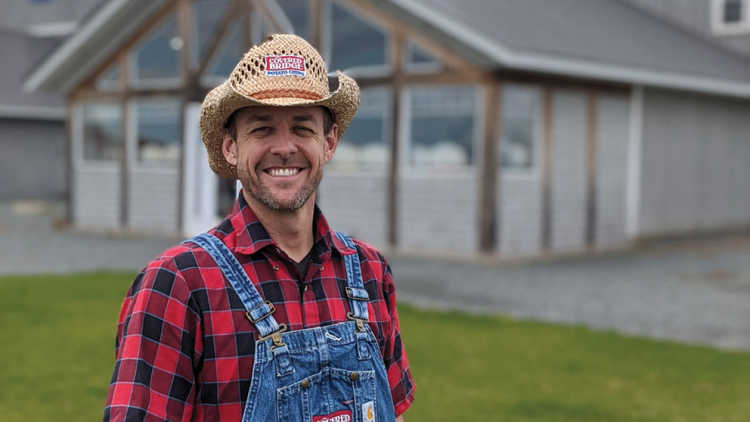New Brunswick farmer takes snack world by storm

With a work ethic that never stops, a steady production line of ideas, an education in hard knocks and knowledge that the right team is more than friends and “yes” people, Ryan Albright has all the hallmarks of a successful agri-food entrepreneur. It’s helped him grow Covered Bridge Potato Chips into a national company with products in 4,500-plus retail outlets across Canada.
In an industry dominated by brands that measure annual earnings in the billions, Ryan’s been able to push past feeling small.
Navigating the nuances of the agri-food sector
It wasn’t easy. When I first started and made pitch presentations to government entities, lenders and ag departments, everyone thought I was crazy. Nobody would support me – no grants, no anything. One bank eventually came on board, but it was very tough. They talked about it being a multi-billion-dollar industry and I’m simply one guy with this little idea.
You are going to experience many downers as an entrepreneur in this space. Ride the little positives to balance out all the lows you will have.
How I learned from my mistakes to “fail better”
As an entrepreneur you will make mistakes. Sometimes they’re little, sometimes they’re big. You need to learn from the big ones. If you don’t, you won’t be in business very long.
As an entrepreneur you will make mistakes. Sometimes they’re little, sometimes they’re big. You need to learn from the big ones.
When we first started, I wanted full bags of chips so our customers felt like they were getting great value. But we didn’t account for the specific gravity of each potato, the settling of chips as packages ship on trucks or chip thickness and curl. As we couldn’t fit the desired volume into the small chip bags, we took turns manually shaking 50 bags per minute to get the chips to settle so we could seal the bags.
Our full-scale distribution move into Newfoundland was another mistake. Two-and-a-half years later we left with our tail between our legs. We didn’t take into account the distances between stores, the distance to Newfoundland itself, and we didn’t have someone there to monitor daily operations. In turn, we lost a pile of money those years.
For every bad mistake I’ve made, I take it as a learning experience. I adjust my way of thinking or how I conduct business. You must learn or you are simply not going to survive. I’ve made a lot of mistakes, but what I try and do is never make the same one twice.
Surrounding myself with the right people is key
When you’re starting out with limited capital, you can’t afford somebody with 30 years experience in an industry. Look for up-and-coming people who are smart, have drive and can help you.
Our company works at a lightning-fast pace and not everybody can keep up. I’ve had people come on board having worked at larger companies, but they just couldn’t handle a pace where expectations are high and you’re responsible for many things at once.
I try and surround myself with self-starters, those with drive and ambition to grow individually who never settle for mediocre. Someone who will push and push. In fact, I prefer people that will come in and challenge me and not just agree with everything I say. If I have to be the sole driver, that’s as effective as paddling a canoe on one side by myself.
Innovation is a never-ending chase
It’s one of our biggest focus areas, without question. Innovation is one of my favourite parts of the business. Not all new products go to market, but we’re constantly developing and innovating new flavours and product lines.
I have an entire book full of ideas and different names I’ve trademarked, plus projects earmarked for a later date.
My team and I meet every two weeks and discuss how we can innovate on something existing or create something brand new and be the first to market. It’s always exciting, but it’s incredibly important to focus on making the best possible decision because there are so many ways you can go with ideas.
Agility is my biggest asset
The fact we can make decisions on the fly without holdup is a huge benefit. Lately with COVID-19, our lead times are slower due to supply chain issues, but we are still fast. Once we have an idea, whether a product or flavour profile, we can turn things around quickly, at least twice as fast as big brands. Larger companies must go through a lot of processes, procedures and layers of approval. At Covered Bridge, we’re sitting around a table and once we agree, we’re just going to do it.
How do I take care of myself?
A lot better now, for sure. In the early days I was on the road a lot, averaging 150,000 kilometres on my car every year, which often doubled as a bed. I now take vacation and a couple of weeks off per year – I never used to. I also work out and eat healthier. It’s still a 60-hour work week, but I’ve found balance. My wife has also helped me see the importance of that.
Professionally, I engage my vice-president a lot. I’m more open with him; he’s my second-in-command and can step into my role whenever needed. I can rest easier knowing he’s ready to jump into action at a moment’s notice.
People in similar industries also talk openly and candidly with me about things, whether it’s supply chain issues, structural issues within the hierarchy of the company or anything else that needs addressing. People ask me questions, too. I’m an open book.
From an AgriSuccess article by Ryan Albright, as told to Trevor Bacque.

Being sustainable and financially viable go hand in hand on the farm. New technologies help meet long-term targets while improving efficiencies and meeting demands of local and global customers.
